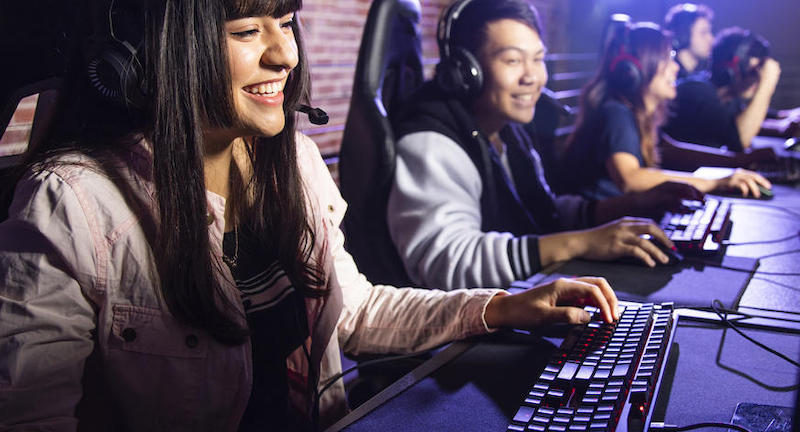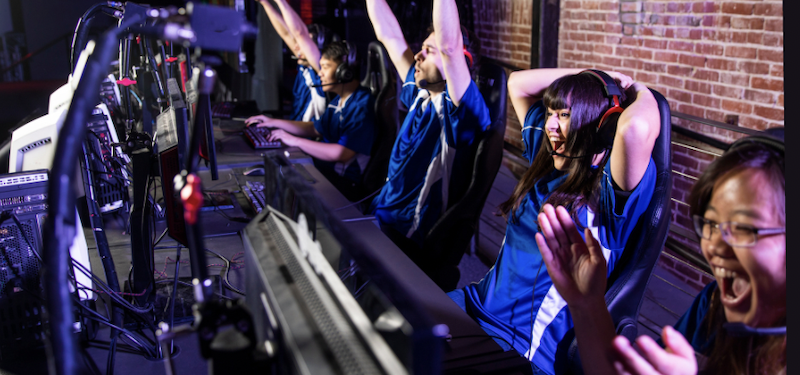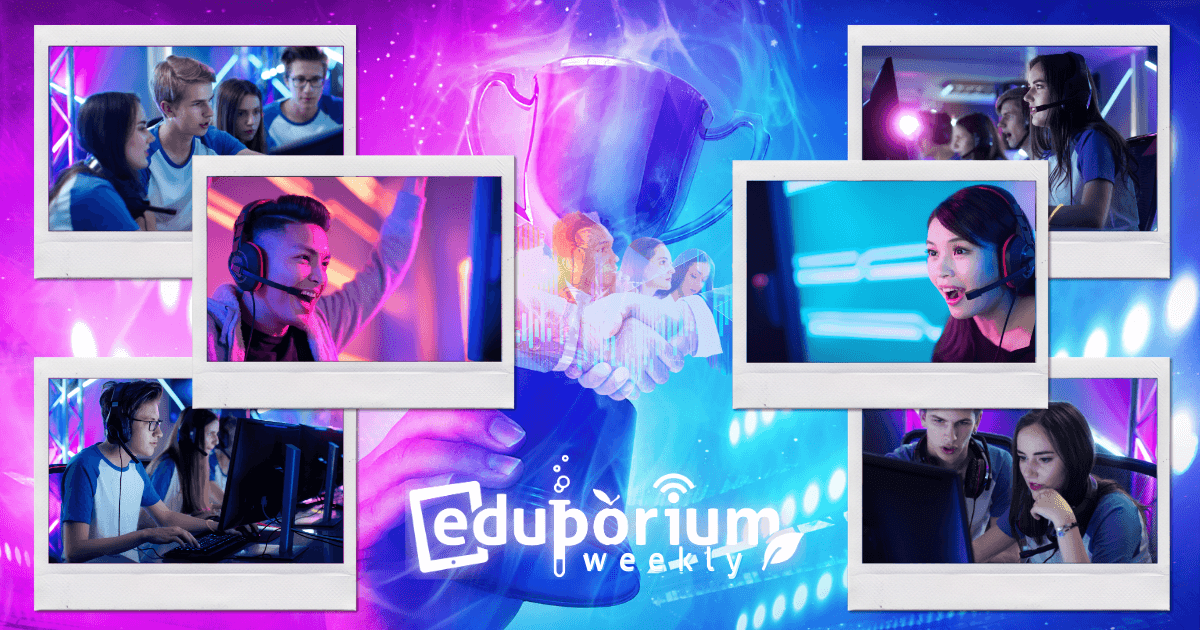The popularity of esports in education isn't likely to fade away. Beyond the various opportunities esports participation creates for students, they also get real chances to compete, feel like part of a team, and work on developing genuine career skills. There's also soft skills related to esports. This commonly involves the students developing a stronger social-emotional foundation when playing and connecting with teammates. Both key elements of 21st century education, esports and SEL have moved much closer together in terms of commonalities over the past few years. And, pandemic or not, students have discovered some fantastic social-emotional benefits from scholastic esports participation.
SEL-Related Benefits of Esports Participation
When school leaders create and offer these programs to students purposefully, esports benefits are often plentiful. It might, however, take a bit more targeted commitment to fully unveil all the social and emotional benefits of esports. Many of those benefits come in the form of soft skill development. And, while this may be important in future careers, it's equally important that children have a strong SEL foundation at all ages. Esports helps foster some of the most sought-after soft skills in both the general workforce and the STEM workforce. Whether that's communication, perseverance, relationship building, or even grit, students can really learn a lot as a result of participating in school esports experiences.
Developing social and emotional skills.
New research indicates that, at the high school level, in particular, SEL benefits can emerge from esports. More importantly, these benefits also foster equity, meaning that students with all backgrounds can benefit from the opportunity to participate in esports. Besides the STEAM benefits of esports, SEL benefits include students developing and valuing relevant social skills. Among these are key SEL skills—like perseverance, team building, and even critical thinking. Besides helping them in a team setting, these skills can also help them in the classroom. Plus, seeing this connection can help make esports even more appealing to many students and potentially drive the growth of school programs.
Esports benefits students in many ways.
Since esports is very team-oriented, numerous SEL benefits radiate from this collaboration. These include things like communication, equity, leadership, modeling, affiliation, and empathy. In collaborating with their teammates, esports athletes can also boost their critical thinking skills. They may even learn how to mentor younger players, which is super valuable in learning about building purposeful relationships. Finally, esports participants often seek opportunities to build these SEL skills. This leads to many of them finding a greater purpose within the school community. When they care about their extracurricular activities, students often connect to them on a greater emotional level, which is big when helping them get the most out of esports experiences when it comes to SEL.

Connecting SEL and Esports
We know that, in order for today's students to thrive in the future, they'll need more than just the academic preparation. Of course, they'll need knowledge on certain topics but they also need hands-on experiences and practice with working in a team environment. Part of the reason this remains relevant is that esports is a very social experience. Students who play are always collaborating with various teammates, solidifying working relationships, and talking strategy. It doesn't hurt that strategic planning and critical thinking are a couple vital skills for them to develop as well. And, when pairing digital skills development with developing creative problem-solving skills, students are that much more prepared.
The relationship between SEL and future success.
Not only will these skills serve students in the future, the SEL side of them will also be important. At the top of the list are creativity and adaptability. So many times, in esports competition, these athletes must work together to make quick decisions that require creative solutions. As you can probably guess, there are very tangible connections between these types of experiences and actual problem solving. Further, relationship development and an ability to quickly analyze problems also come with esports participation. This remains important because an ability to understand feelings, analyze situations, and evolve relationships helps with creating some of the main connections between SEL and real-world success.
Pairing SEL with esports creates real value.
Having a strong SEL foundation is such a huge aspect of modern career readiness. Since interscholastic esports helps children build that foundation, it's a very popular approach. Combining gaming with SEL is also an effective option. It gives students practice with analyzing problems and efficiently communicating what they learn. Students can go on to develop some tech skills but, without the proper SEL background, they're more likely to forego developing those equally important soft skills. Therefore, working as part of a team from a young age—a team in which problem solving is a huge component—can help immerse them in tremendous real-world experiences that prove valuable in the long term.
Benefits of Joining an Esports Team
While more education leaders adopt student esports programs, some argue that esports belongs in every school. From social-emotional and career readiness perspectives, they certainly could make this argument. Esports combines traditional elements of interscholastic sports with some of the current methods students use to connect with each other. That's why being part of a school esports team could be just as beneficial for students—especially today's students—as traditional sports. As we've said, student gamers can learn both hard and soft skills through gaming experiences. They include leadership, teamwork, communication, and even how to win and lose with respect for opponents. Even if they're not close with these opponents, the right attitude can truly help students learn about building new relationships.
Teaching hard and soft skills.
Esports participation could even help students work on mindfulness. In competitive gaming environments, they may experience taunting or inappropriate behavior. These experiences can help them learn to keep a level head and address conflict productively. As for hard skills, navigating digital worlds is at the top of the list. Of course, technology and the Internet are such huge pieces in the modern workforce. Not everybody knows how to keep safe and maximize these tools, however. Since esports competition typically involves online gaming, this presents opportunities to teach important digital citizenship lessons. When coaches see the experiences their students might deal with, for example, they can help them learn from them and steer them away from the toxicity they sometimes encounter online.
Esports and future career possibilities.
Like we said, esports could help students develop a stronger sense of belonging, which is great for overall social-emotional health. Lots of students who'll get involved with school esports have never participated in other school clubs, teams, and activities. The often inclusive and welcoming environments associated with esports allow them to be themselves and, in many cases, learn to be more social. On the flip side, esports experiences can actually help students forge a career path. For any students who aren't sure about future goals or passions, it's a great opportunity for them to explore. Esports could also help illuminate potential professions whether they are related to STEM or not. These include marketing, streaming, managing, and many others that CTE students, in particular, can benefit from exploring. And, in return, they can begin to feel more comfortable about their futures.

SEL Competencies and Esports
As you've seen by now, there are a lot of specific benefits students can enjoy from esports. These include academic, social, personal, and even career-focused opportunities for them to better themselves. Besides soaking in beneficial experiences as a byproduct of their involvement in esports, students also have a key opportunity to polish specific skill sets that can help them learn how to continually develop. It's surprising how closely some skills these students develop through esports participation correlate to national STEM, educational, and even emotional standards. This just goes to show, however, how interscholastic esports participation can be transformative for students in more ways than one.
Learning to fail productively.
Some of the esports-related SEL skills we haven't mentioned yet are self-management, perseverance, and grit. Each of these are, of course, tied to social-emotional learning and emotional regulation in addition to the gaming experiences. Just like in the classroom or on the athletic field, esports athletes may experience frustration with themselves or teammates. As such, learning how to take advice properly is a skill that often truly helps them learn about perseverance. At the same time, addressing any frustrations in a more healthy way can help them learn self-management skills. And, that's a perfect opportunity for them to learn how to use failures as motivation rather than letting them dictate discouragement. With teammates around to pick them up, struggles in esports are great learning opportunities.
Making everybody feel welcomed.
Another way that esports helps improve student experiences in their school community is simply through involvement and inclusion. As we've said, a lot of esports athletes aren't involved in many other clubs and activities within their school community. If their school leaders show that they care about their interests by giving the green light for starting an esports program, however, this can help them to feel more welcomed. And, feeling like a true part of the school community can go a long way in helping to shape their attitudes towards succeeding in the classroom, socializing, and focusing on their futures. Esports participation can give students a real sense of pride while helping them to see that they do truly belong. And, to be honest, feeling more comfortable around campus can even lead to better academic performance, too.
Maintaining Social Connections Through Esports
Some people might naturally associate gaming with isolation. It's the same as us assuming that teenagers who are constantly looking down at phones aren't interacting with the world. In many cases, however, this isn't true. Technology and gaming both enable teenagers to experience connection levels like never before. They are always a tap or a click away from an interaction with a close friend and esports endeavors involve a similar path. Like we've said, esports is very much a team sport with lots of avenues for socialization and collaboration. Especially in the pandemic era, technology helped student gamers stay in contact with their friends and teammates, helping to break those very isolation barriers that many assume to be hinderances all while solidifying social connections.
Tying esports to academics.
Esports programs in schools can also help to improve the overall school culture and it's actually a pretty simple concept. Many of the students who are involved with esports already know they have an interest in gaming and have skills in the area. Esports gives them a smaller place within their school community to do something they care about. For comparison, if they don't care as much about their academics, they could, unfortunately, tend to emotionally shut down in an educational setting. But, giving them something to look forward to can boost morale throughout each school day and even positively affect their academic growth. Perhaps they'll even start seeking out opportunities for collaboration in the classroom after experiencing it and how powerful it is in gaming.
Technology creates connections.
On the flip side, immersing themselves in the worlds of gaming and technology doesn't always mean their relationship development suffers. Even if it's not face-to-face, human connections still have a huge social-emotional impact on kids, especially in middle school and high school. Collaboration even helps breed an increased sense of belonging with many students. In fact, esports is comparable to project-based learning experiences in which students are collaborating and actively working on solving problems. That's basically what they are doing by participating in esports, too. Another comparison is in student ownership. Gaming allows students to learn about taking ownership of their mistakes and successes. Like in PBL and in other aspects of education, taking ownership is a fantastic step towards becoming truly ready for the real world.
If you're interested in learning more about starting an esports program in your school, we encourage you to contact our team. There are many resources for helping technology directors and athletic directors launch informal esports clubs and full-fledged competitive programs. Check out our store as well to find high-end esports equipment. And, for all EdTech, STEM, and CTE news, follow us on Twitter and Instagram, like us on Facebook, or sign up for our newsletter for our latest product announcements and offerings.







